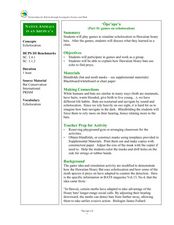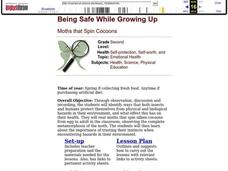Curated OER
Games on Echolocation
Get a little batty with life science! This fun simulation game replicates how bats use echolocation to hunt moths in their native Hawaiian habitat. After creating blind folds and discussing some basic principles of echolocation, students...
Curated OER
Who am I?
Here is a colorful worksheet that has learners identify 16 different kinds of insects. Each insect has an accurate and colorful drawing associated with it. The insect names are at the bottom of the worksheet, and pupils must match up...
Curated OER
Butterflies
Butterflies and moths are the stars of this biology resource. In it, learners see how to distinguish a butterfly from a moth. They discover new vocabulary, perform an experiment, and do some coloring on pages that are embedded in the...
Alabama Learning Exchange
Is it a Moth or a Butterfly?
Second graders examine the similarities and differences between moths and butterflies. They participate in a virtual field trip using a designated web site. They design a computer based slideshow using the information they find on the...
Curated OER
Butterfly Round-Up
Students classify the characteristics of butterflies and moths moths. In this life cycle lesson plan, students identify butterflies and moths common in the state of Iowa as well as their characteristics. Students then learn the proper...
Curated OER
Moths and Butterflies crossword puzzle
In this moths and butterflies worksheet, students complete a crossword puzzle about moths and butterflies. Students complete 26 blanks in the crossword puzzle.
Curated OER
Butterfly and Moth Internet Hunt
For this butterflies and moths worksheet, students click on the links in the questions about butterflies and moths to find the answers to the questions and then come back and answer the questions. Students answer 14 questions total.
Curated OER
Main Idea and Supporting Details on Two Topics-Neeraj and Moths
Learners explore details, supporting details, and main idea statements. In this details and ideas lesson, students view two video segments and determine relevant details. Learners identify the main ideas and defend them.
Curated OER
Cloze Activity: Mini Worlds
In this butterflies, moths, and caterpillars cloze procedure worksheet, students review a brief selection that is missing 10 words and then attempt to fill in each blank with a word they think the author might have used. A word bank is...
Curated OER
Super Scientist Quiz
In this science worksheet, students match each of the descriptions on the right to the correct scientist listed on the right. There are thirty scientists to identify and match on the sheet.
Curated OER
Butterfly or Moth?
Students compare and contrast the characteristics of the butterfly and the moth. Through classification, students observe the subtle differences in the moth and the butterfly. Students complete a worksheet classifying butterflies and...
Curated OER
A Moth Is Not a Butterfly!
Students identify the differences and similarities between a butterfly and a moth. They complete a Venn diagram, participate in class discussion and conduct related Internet research on the topic.
Curated OER
Going Buggy!
Students study bugs over a four week period. In this insect collection of activities, students observe insects covering basic science concepts and skills, such as classification, observation, and responses to habitat. Students develop...
Curated OER
Mini Worlds
In this insects learning exercise, students 18 questions regarding butterflies, moths, bees and spiders. A print out version of this learning exercise is available, but the online version contains links to various webpages with...
Curated OER
Butterflies and Moths- Order Lepidoptera
In this butterfly and moth worksheet, students describe the difference between the two as well as label different parts of a butterfly and moth.
Curated OER
Moth
In this animal facts worksheet, students will read information about moths including what they eat and where they live. Then students will color a picture of a moth.
Curated OER
Being Safe While Growing Up
Second graders identify ways that both insects and humans protect themselves from physical and biological hazards in their environment. They rear moths from egg to adult and consider the importance of trusting their own instincts.


















